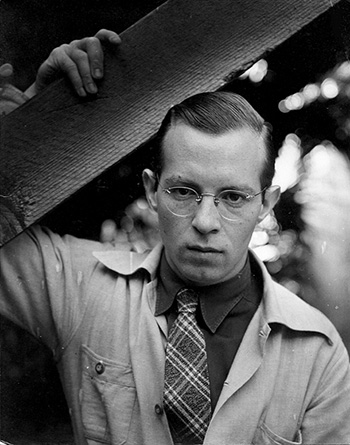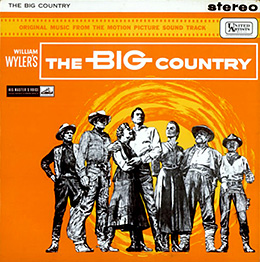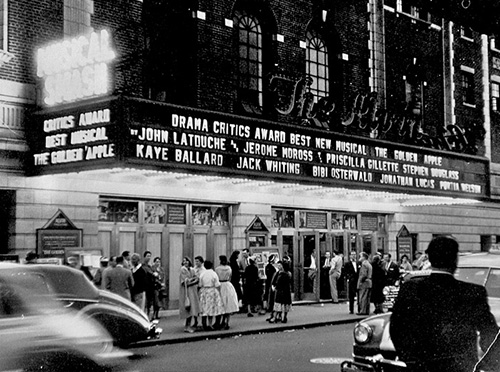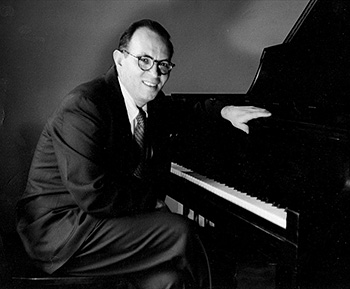

  |
|
|
||||||||||||||||||||||
|
FMS FEATURE... July 30, 2013 Jerome Moross Centennial Innovative composer for film, theater, concert hall remembered by Jon Burlingame  Moross forever changed the sound of Western movies with his classic, Oscar-nominated score for The Big Country in 1958. But he was also an innovator in the musical theater, in ballet and in other musical realms. His Broadway show The Golden Apple was a landmark achievement combining opera with musical comedy; and he consistently surprised critics and audiences alike with his fresh approaches in the worlds of chamber and symphonic music as well. Born on August 1, 1913, in Brooklyn, he graduated at age 18 from New York University, and in the 1930s was a member of Aaron Copland's Young Composers Group. Yet, as Christopher Palmer points out in his The Composer in Hollywood, Moross, "independently of his friend Copland, sought to develop an authentically American nationalist idiom which was not exclusively jazz-orientated but drew nourishment from a great variety of American folk and popular music cultures: musical comedy, vaudeville, folksong of the Appalachian mountain variety, spirituals, blues, rags and stomps."  Starting in 1948, he began getting film assignments of his own, culminating a decade later in his masterpiece, The Big Country, a sprawling Western directed by William Wyler and starring Gregory Peck, Charlton Heston, Carroll Baker and Jean Simmons. "For this film," says Mariana Whitmer, executive director of the Society for American Music (and author of a book-length study of the score), "Moross intentionally defied the familiar notions of how a Western should be accompanied and composed an imposing symphonic score that continues to inspire film composers." Film-music historian John Caps cited "the authentic folk-song quality of the score, intentional and quantifiable," finding the music "rhythmically alive... [containing] that maverick, reckless, runaway pulse" that helped to define it as belonging to the American West. Palmer declared its rhythms "sturdy, muscular, rugged, sprung of the native soil. Moross's musical language – its tunes, its chords, its rhythms, its structure – is basically very simple. It is also personal to Moross." Moross' score, recognized with an Academy Award nomination, redefined the sound of the Western. "Moross captures the sense of wide-open spaces and the grandeur of the Old West with a style that will be ably assimilated by Elmer Bernstein [and other composers] in the 1960s," adds author Roger Hickman in his book Reel Music: Exploring 100 Years of Film Music. And it brought more offers to Moross, whose other Westerns included The Proud Rebel (1958), The Jayhawkers (1959), The Adventures of Huckleberry Finn (1960) and the themes for television's popular Wagon Train (1959) and Lancer (1968).  But Moross was far from solely a film composer. He was constantly experimenting in every musical genre. His ballet Frankie and Johnny (1938) drew on folk themes; his Ballet Ballads (1948) combined ballet and theater; and his remarkable The Golden Apple (1954) (with librettist and lyricist John Latouche) won the New York Drama Critics' Circle Award for Best Musical and, according to reviewers at the time, was nothing short of brilliant. It was a retelling of Homer's Iliad and Odyssey myths set in turn-of-the-century Washington state and anticipated the sung-through musical years before it became popular. Its best-known song is "Lazy Afternoon," introduced by Kaye Ballard and since covered by everyone from Barbra Streisand to Tony Bennett. He composed his first and only symphony during the war years. As Buffalo Philharmonic conductor JoAnn Falletta recently observed, "Moross used traditional forms... in music that was intrinsically American. Reminiscent of the wide spacing and tonal purity of Copland's works, Moross brings his own accessible humor to the symphonic form." None other than Sir Thomas Beecham conducted the premiere of the symphony in Seattle in 1943. Moross regularly challenged the status quo: His Gentlemen, Be Seated! received only three performances at New York's City Center Opera in 1963: its review of events during the Civil War, performed as a minstrel show, was too much for critics or audiences to handle as the civil-rights movement was reaching its height. He spent much of his last decade writing chamber music and turning Lucille Fletcher's radio play Sorry, Wrong Number into a one-act opera (1977). Moross died on July 25, 1983.  Moross's career is celebrated in a nationally syndicated two-hour special, Jerome Moross: "The Big Country" and Beyond, produced by the WFMT Radio Network and hosted by Michael Feinstein. Classical radio stations will be broadcasting it beginning Aug. 1. More details are at moross.com. ©2013 Jon Burlingame |
Search
Past Features
Feature Archives
|